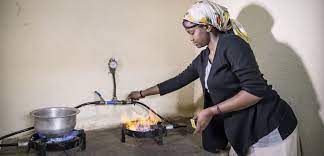Small scale or decentralised anaerobic digestion is widely underutilised in industrialised countries. Decentralised units can be placed on farms to treat waste and produce heat and electricity as well as nutrient rich digestate. Biogas from units can be used simply as a cooking gas or transformed for heat or electricity.
Farm scale AD units can be shared within a community to make it more financially assessable and to share the benefits within a community. Waste for the surrounding areas can be treated in the digestor reducing local smells and waste build up. famers can also charge to take in waste from businesses such as hotels.
The products of AD biogas and digestate can then be used at the discretion of the farmers or the community. Nutrient rich digestate can be distributed within the community as a crop fertiliser. Stored biogas can be used for on site heat and electricity. excess electricity generated can be sold to the grid as well as biomethane introducing income to the farm.
Developing countries
In developing countries where solid fuels such as wood are relied on for cooking, production of biogas has many benefits.
Low tech AD consists of a closed pit in the ground when waste can be inserted and gas can be collected. Animal waste and crop waste from family farms can be inserted in the the digestor when microbes produce biogas. This biogas can be linked to indoor gas cookers that provide cooking gas on demand, while significantly reducing smoke levels indoors.

This method of clean cooking is closely linked with gender equality. Women are more exposed to smoke levels within the home as well as increased work load of collecting solid wood fuel. The use of Biogas reduces work load as well as negative health effects associated with smoke inhalation.